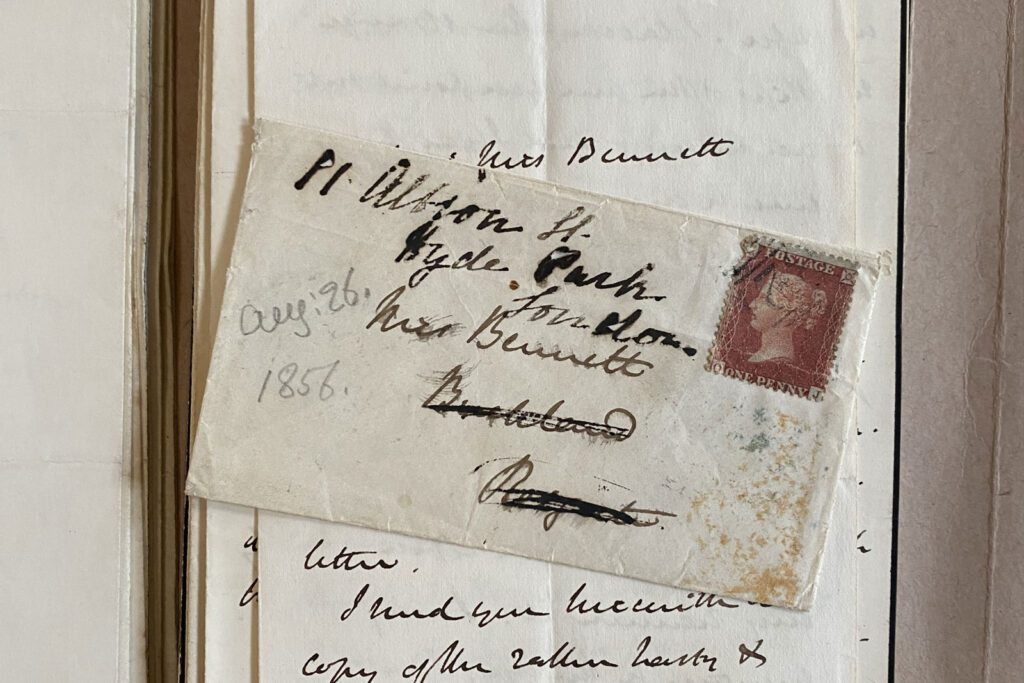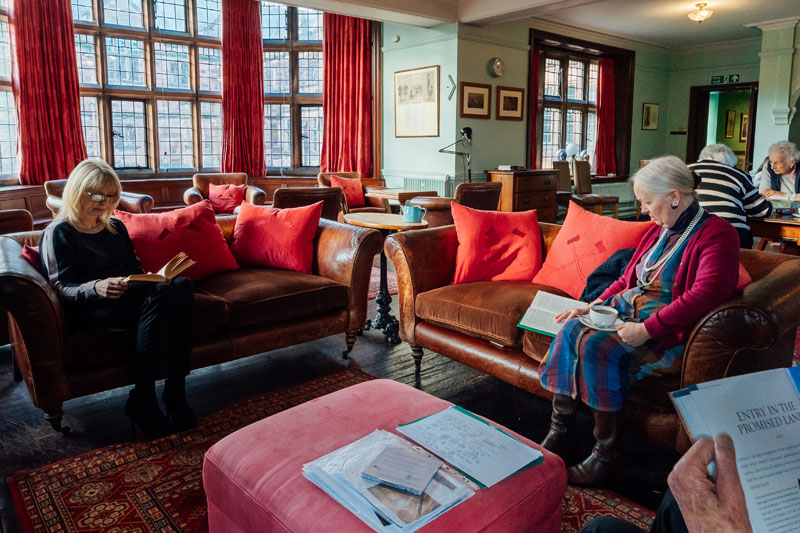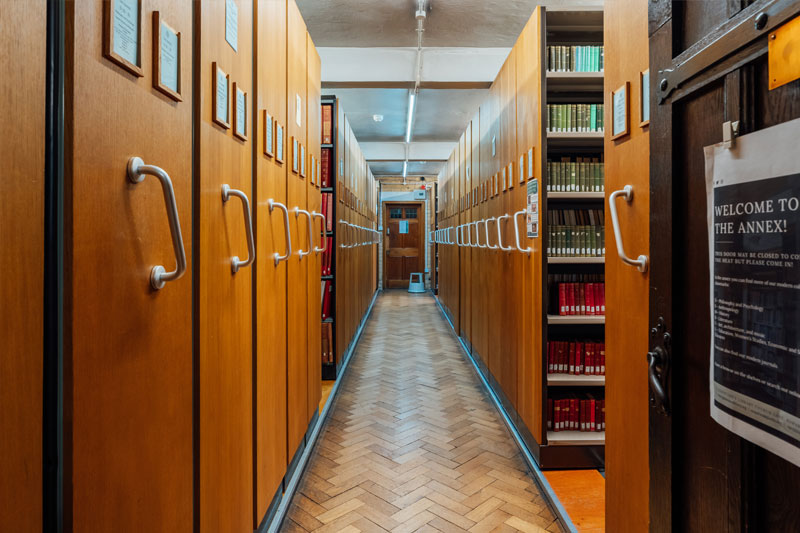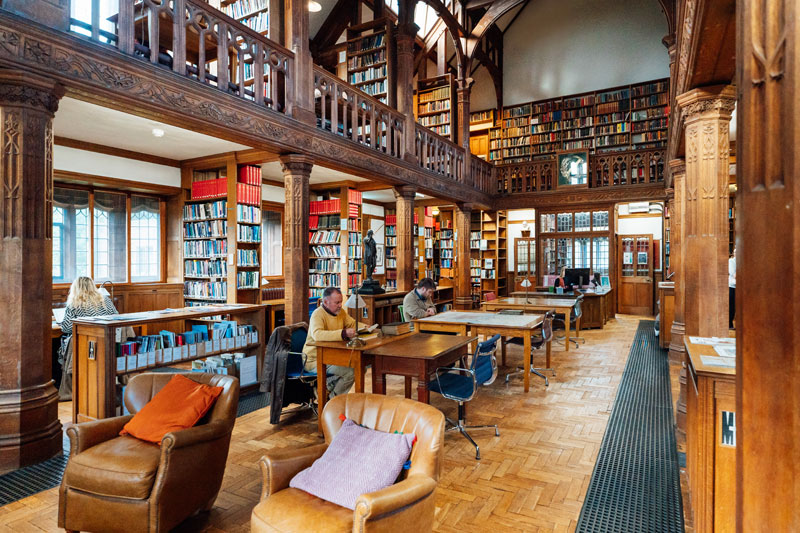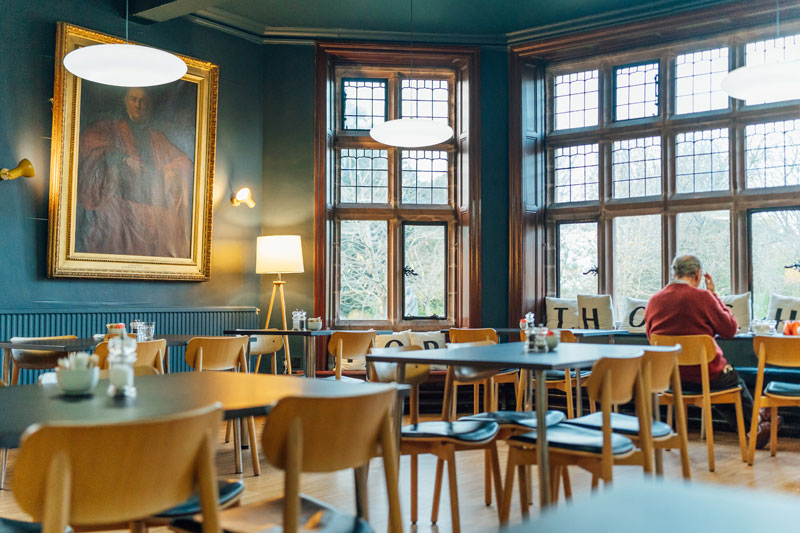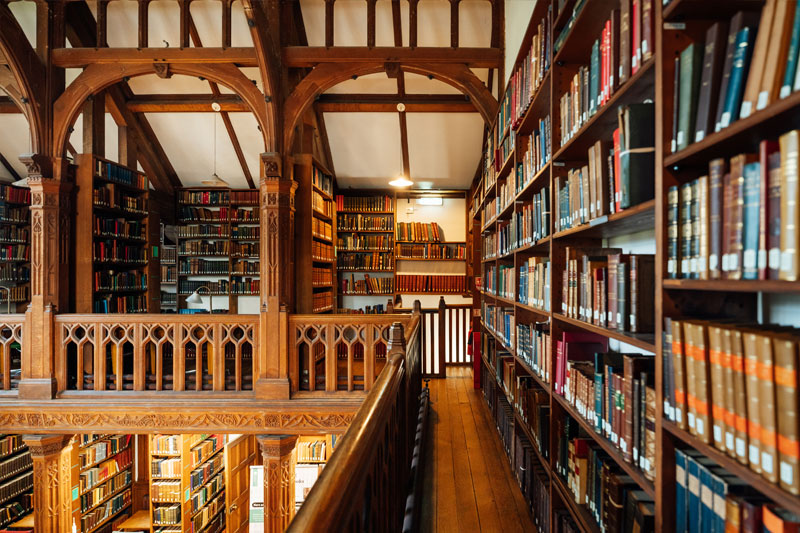Gladstone’s Library has significant archive holdings related to history, politics, literature, and theology.
Archives are materials that are the product of an individual, group, or institution’s daily activities. They may include items such as letters, diaries, drafts of essays and articles, maps, plans, photographs, audiovisual material, and legal and business records that have been preserved because they are deemed to be historically significant. They may be physical or digital.
Gladstone’s Library’s archives provide a rich source of information regarding:
- The life of William Ewart Gladstone and his close family
- The history of enslavement in Jamaica and Guyana
- Nineteenth-century studies
- Nineteenth-century literary culture
- Crime writing
- Nineteenth-century church architecture
- Anglican theology, liberal theology, and church history
- The history of Gladstone’s Library
Search Catalogues
Our Collections
Gladstone’s Library holds the following archives. Please note that not all of these archives have been catalogued and so are not all currently available to view. You can browse the archives using the links below or by searching Archives Hub here.
- Alan Marshall Fairhurst Archive
- Anne Ramsden Bennett Archive
- Anthony Freeman Archive
- Arthur Macdonald Allchin Archive
- Bishop Gladstonian Memorabilia Collection
- Crime Writers’ Association Archives
- Detection Club Archives
- Charles Alfred Howell Green Archive
- Cowley Fathers Archive
- Don Cupitt and Sea of Faith Archive
- Edward Moss Archive
- Eric James Archive
- Esther de Waal Archive
- Gladstone’s Library’s Objects and Paintings Collection
- Glynne-Gladstone Archive
- Invitations and Visits Book of Maud Ernestine Gladstone
- Jim Cotter Archive
- John Moorman Archive
- John Robinson Archive
- Lloyd Geering Archive
- Louisa Gladstone Archive
- Michael Mallett Archive
- Modern Churchpeople’s Union Archive
- Movement for the Ordination of Women Archive
- Papers of Edith Olive Checkland
- Papers of John Ruskin
- Papers of William Steuart Gladstone and William Robert Gladstone
- Robert Jeffery Archive
- Robert Symonds Archive
- Rural Ministry Archive
- Rural Theology Archive
- Sea of Faith Network (UK) Archive
- Sir Stephen Glynne’s Church Notes
- St Deiniol’s Library Archive – Gladstone’s Library’s Institutional Archive
- William Ewart Gladstone Memorial Collection
We also hold a copy of all of the Gladstone Papers held at the British Library – the companion archive to our Glynne-Gladstone Archive – on microfilm.
Everyone is welcome to consult material from the archives including researchers, students, and members of the public. Access to archives is provided in the Reading Rooms, but we also offer other services including answering remote enquiries and supplying copies of original material for research, teaching, exhibition, and publication. For more information about this see our Reprographics and Research Services page.
Our archives are also regularly used as part of Gladstone’s Library’s public engagement programme and series of events.
Archives are available to be viewed Monday to Friday, 9.30am-1pm and 2pm-4.30pm.
To make an appointment for a viewing, please complete a Request to View Archives and Special Collections form. A member of the Reading Rooms team will be in touch to book your desk and confirm your visit.
Please contact us to make your appointment as far in advance of your proposed visit as possible so that you can definitely book a space. The Reading Rooms can be very busy and occasionally are closed entirely for special events and collections care.
You must allow at least 14 days’ notice so that we can check whether there are any data protection issues that may prevent your access to any items from the archives that you would like to view. If any of the material that you have requested does contain personal data, you will be sent an application form that enables us to check that your request is lawful. More information about this can be found under ‘Access conditions’ below.
If you aren’t a Resident or Reader at Gladstone’s Library you will be asked to complete a short form to be given a Researcher pass for the day.
All visitors must show photographic identification and proof of address when they arrive for their viewing.
When planning your visit please be aware that no more than 10 files can be viewed in one day and some items cannot be photographed due to their condition.
Many of the items in our archives are available for anybody to look at upon request, however, some items have restrictions or are closed to viewings.
Some items in our archives contain personal data or special category data, which means that access to them is restricted or potentially closed completely under data protection legislation. This may apply to any records created in the last 100 years.
Under the UK General Data Protection Regulation and the Data Protection Act 2018, personal data relating to living persons may only be accessed by individuals completing historical, scientific, or statistical research and with a view to publish some journalistic, academic, artistic, or literary material that is in the public interest.
In addition, the following conditions must be met:
- The data must not be processed to support measures or decisions with respect to particular individuals;
- The information obtained must not be used in any way which might identify or lead to the identification of particular individuals;
- The data must not be processed in such a way that substantial distress or damage is, or is likely to be, caused to any data subject;
- The information obtained must not be divulged to a third party;
- The confidentiality of any information unconnected with the subject of the research, which may be seen in the course of using the records, must not be breached.
Special precautions must be taken for special category data (or particularly sensitive data), meaning that items from our archives that contain this kind of data may be closed completely until we can be sure that all of the relevant individuals are no longer living. Special category data includes:
- personal data revealing racial or ethnic origin
- personal data revealing political opinions
- personal data revealing religious or philosophical beliefs
- personal data revealing trade union membership
- genetic data
- biometric data (where used for identification purposes)
- data concerning health
- data concerning a person’s sex life
- data concerning a person’s sexual orientation.
In some cases a depositor may also have requested that a closure period be put on records.
If an archive has not been catalogued yet or is in the process of being catalogued then it will also most likely be unavailable to be viewed at present.
Support our archives
Gladstone’s Library is a charity and on average it costs us £20,000 to catalogue an archive due to the cost of housing and preservation materials, and staff time as cataloguing is a lengthy process. If you would be interested in donating to the Library to help us catalogue one of our archives please contact us to find out more.
